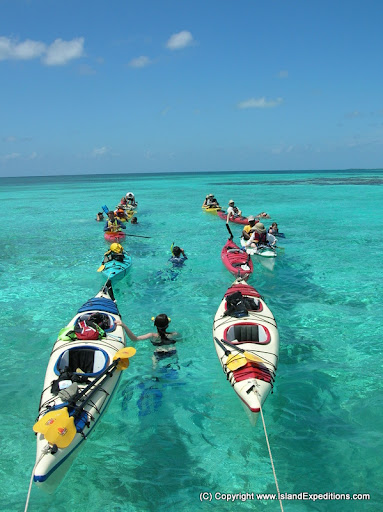Visitors to South Water Caye and Glovers Reef Marine Reserve There is a visitor fee to use the reef areas you are visiting. At some point during your kayak rental you will be approached by a Belize Government Fisheries Officers or Park  Ranger. The fee structure is $10 BZ per day or $30 BZ per week in each of the parks for each person. You are responsible to make these payments. Fees are collected by Fisheries and a ticket will be issued to you at the time of payment. Please retain this ticket as proof of payment for your visitor fees. Fishing Fishing is catch and release only in the park areas. There is a Sport Fishing License requirement and will cost you $25 BZ per person. Please purchase your license when you pay your park fees. Responsible and Respectful Snorkeling Coral Reefs are among the world’s most spectacular habitats and snorkeling is an excellent way to explore them. As coral reefs face an increasingly uncertain future, snorkelers can play an important role in helping protect these fragile habitats. Please follow these simple guidelines to help protect the coral reefs you visit. Before getting in the water
Ranger. The fee structure is $10 BZ per day or $30 BZ per week in each of the parks for each person. You are responsible to make these payments. Fees are collected by Fisheries and a ticket will be issued to you at the time of payment. Please retain this ticket as proof of payment for your visitor fees. Fishing Fishing is catch and release only in the park areas. There is a Sport Fishing License requirement and will cost you $25 BZ per person. Please purchase your license when you pay your park fees. Responsible and Respectful Snorkeling Coral Reefs are among the world’s most spectacular habitats and snorkeling is an excellent way to explore them. As coral reefs face an increasingly uncertain future, snorkelers can play an important role in helping protect these fragile habitats. Please follow these simple guidelines to help protect the coral reefs you visit. Before getting in the water
- Get the best possible instruction/information you can.
- Practice snorkeling skills away from the reef.
- Make sure your equipment fits properly before you snorkel near corals.
- If you feel uncertain wear a PFD to help with buoyancy.
- Learn all you can about the local coral reefs.
- Put on sun screen 30 minutes prior to entering the water – sun screen can damage corals so please avoid using excessive amounts. It is now being suggested that we use biodegradable sunscreen whenever possible when going into the water.
Once In the Water
- Never touch corals; even slight contact can harm them. Some corals can sting or cut you as well.
- Select points of entry and exit to avoid walking on corals.
- Maintain a comfortable distance from the reef to avoid contact.
- Know where your fins are at all times and avoid kicking up sand or touching the coral with your fins. Minimize kicking when in shallow areas.
- Stay horizontal in the water while you are near or above the reef.
- Learn to swim without using your arms.
- Move slowly and deliberately in the water, relax and take your time.
- Remember LOOK but DON’T TOUCH. Do not harass marine wildlife!
- Take nothing living or dead out of the water except recent garbage if you come across it.
- NEVER chase or try to interfere with marine wildlife – remember we are visitors in their habitat.
- Never touch, handle, or feed marine wildlife.
- Avoid using gloves in coral environments.
Talk to the locals, especially Park Rangers/Officers, about the local reef and any additional guidelines or restrictions.